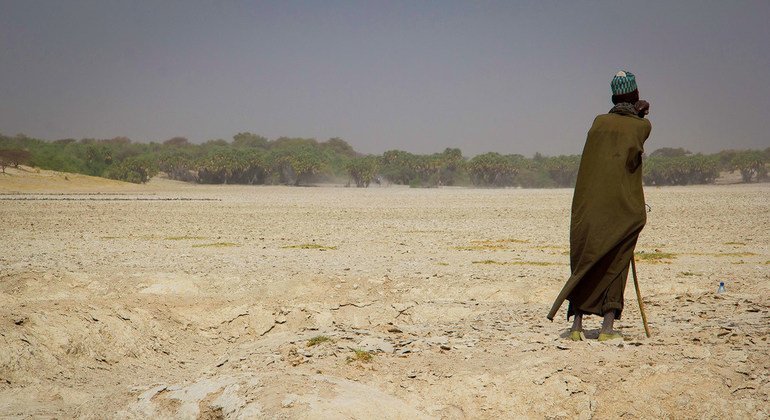During the UN Water Conference, held at UN Headquarters between 22-24 March, Two countries joined the Convention, against the backdrop of a growing global water crisis, in which climate change, pollution, and rising demand are posing challenges for developing and developed countries alike.
On Thursday Nigeria became the 48h country to join the treaty. The fast-growing country, the most populous in Africa, is dealing directly with the effects of desertification, having seen Lake Chad, an important water source, shrink by around 90 per cent since the 1970s.
And on Friday, Iraq also joined, the first in the Middle East to do so. Nineteen of the 22 Arab countries are considered water scarce, and nearly all Arab States draw upon transboundary water resources that cross one or more international boundaries. Iraq is experiencing mounting social, economic and political pressures due to water scarcity.
On the second day of the Conference, Conor Lennon from UN News moderated a discussion at the SDG Media Zone, on how to improve cross-border cooperation between countries which share water resources. He was joined by Sonja Köppel, the Secretary to the Water Convention, and Suleiman Adamu, Nigeria’s Federal Minister of Water Resources.
The following is an edited summary of the SDG Media Zone session.
Conor Lennon: What has the Water Convention achieved since it entered into force in 1996?
Sonja Köppel: More than 60 per cent of all freshwater resources are shared by two or more countries, so cooperating on the use of those waters is crucial for peace, sustainable development, and climate action.
The Water Convention is a unique legal and intergovernmental platform, which has helped to facilitate up to 100 agreements between countries, helping to prevent conflicts, and set up strong institutions for its joint management.
In Europe, it has led to concrete energy generation agreements, and improved ecosystem well-being. And, in recent years, there has been an increased momentum for cooperation.
In Africa, around 20 countries are in the process of accession to the Convention, and now there’s also increasing interest in Latin America, and even Asia.
The Water Convention is highlighting the topic of transboundary water cooperation at the international level, and this is now reflected in the SDGs [Sustainable Development Goals]. Target 5 of SDG 6 (Clean Water and Sanitation for All) includes a call for transboundary water cooperation.
Conor Lennon: What difference will joining the Convention make to Nigeria?
Suleiman Adamu: What is important is that we are now moving from a regional situation to a more global community. Water security is very important to us. We are dealing with Boko Haram terrorism in the northeast, partly due to the lack of opportunities arising from the shrinking of Lake Chad. We hope that joining the Convention will draw more attention to this issue.
Conor Lennon: Lake Chad has shrunk some 90 per cent over the last 60 years. This must have made a huge difference to people living in that region.
Suleiman Adamu: We estimate around 14 million people are affected in one way or the other, in one of the poorest areas on earth, where people are dealing with desertification and other climate challenges.
We worry that, sometime in the next few decades, we might find that there will be no Lake left at all. We really need to wake up and address this challenge.
The crisis has also moved inland, because some of the grazing areas around the Lake Chad are no longer available. There is growing conflict between nomadic herders and sedentary farmers in the middle section of the country, and there’s a move towards the south, where there is better quality land, in the absence of what used to be available around Lake Chad. It’s a big challenge for Nigeria.
Sonja Köppel: Accession to the Water Convention means that Nigeria will be able to benefit from the global expertise, capacity building, and good practices from existing parties in different parts of the world. It also sends a positive signal to the international community, including international financial institutions.
It can also mean support for climate change adaptation because, as we all know, water and climate change are closely interlinked. The Water Convention is helping countries by developing joint adaptation strategies, so Nigeria will be able to bring forward its requests and needs.
Conor Lennon: Are you resigned to Lake Chad disappearing? Or can it be saved?
Suleiman Adamu: The inter-basin water transfer project from the Congo Basin to Lake Chad is probably one of the best solutions to this problem, because we can’t stop desertification. It’s a large-scale, drastic solution, to move a large volume of water, that generally flows into the Atlantic Ocean, to Lake Chad.
Conor Lennon: Can the global water crisis be solved?
Sonja Köppel: We need to mobilize governments at the highest level and mobilize financial institutions and the private sector. We also need to involve civil society and young people, and have strong advocates for water, demonstrating that water is crucial for all the Sustainable Development Goals.



